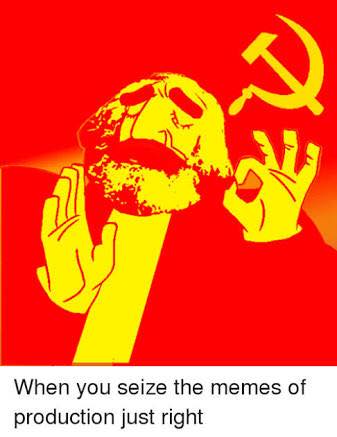Francis Russell discusses the meme strike, ‘Wages for Facebook’ and online labour, arguing that these new movements reveal the emerging relationships between subjectivity, the internet and work.
Since this Wednesday a host of popular memes pages—and not so popular meme pages—which publish on Facebook have decided to go on strike in protest of the lack of transparency regarding the popular social networking site’s seemingly random approach to censorship. While the #zuxit campaign is overtly motivated by the desire to call attention to, and perhaps eliminate Facebook’s seemingly random deletion of meme pages, the #zuxit event is interesting for the way it unintentionally draws attention to the broader question of reproductive labour online, or “Wages for Facebook.”
“Wages for Facebook” is a single serving site—a website that comprises of a single page, and as serving a single function—developed by the artist and curator Laurel Ptak, and which comprises of a series of scrolling paragraphs in black text that outline a critique of the ideological framing of Facebook as a “social networking” platform. While the conventional view of Facebook sees it as a free website that allows users to connect with each other, share images and stories, and build groups and pages for like-minded individuals, Ptak’s “Wages for Facebook” presents the site as a pernicious form of reproductive labour. While Facebook is framed as a free platform, the very value that the site generates is linked to the amount of users involved—since it is the number of users, and the time that they spend on the page, that presents Facebook as an attractive space for paying advertisers. The question that Ptak’s work poses, however, is just what keeps people coming to Facebook? What peaks their interest and keeps them visiting the site so as to be primed for the advertising content that is so inextricably bound to Facebook’s revenue? For Ptak we must understand Facebook to be run on free labour, the unwaged affective labour of sharing, posting, debating, and commenting that makes the site worth visiting in the first place.

While the demand for “Wages for Facebook” could seem both naive and superficial, it is important to link it back to the “Wages for Housework” movement that serves as its main source of inspiration. As Kathi Weeks has argued in her indispensable The Problem With Work: Feminism, Marxism, Antiwork Politics, And Postwork Imaginaries, the “Wages for Housework” movement is perhaps best understood in terms of the critical power of the demand. As opposed to literalising the movement as merely an instrument for gaining pay for reproductive labour, Weeks sees the “Wages for Housework” movement as crucial insofar as it reveals housework as something imposed, as something arbitrary and without a grounding in a woman’s “nature,” and therefore mutable and contestable. This is not to say that women only did, and only continue to do housework because they are forced to do it, but that, instead, any pleasure or fulfilment derived from reproductive labour is secondary to the social power that demands that this labour be performed. For Weeks, by challenging the idea that women “naturally” want to do housework, that they are compelled by their gender to do so, the movement was able to open up a new terrain of struggle simply by making the demand.
Similarly, Ptak’s project, in simply making the demand, raises questions about whether or not the use of Facebook is reducible to a causal model of an autonomous user who chooses to utilise Facebook purely through their own volition. Or, to quote the “Wages for Facebook” page,
To say that we want money for facebook is the first step towards refusing to do it, because the demand for a wage makes our work visible, which is the most indispensable condition to begin to struggle against it. Against any accusation of ‘economism’ we should remember that money is capital, i.e. it is the power to command labour.
Crucially, it is the exposing of Facebook as unwaged work that signals the real power of Ptak’s aesthetic intervention. Indeed, we can broaden the scope of Facebook’s connection to the ideology of work, since, as Alfie Bown has argued in his book Enjoying It: Candy Crush and Capitalism, one of the functions of “time wasting” digital platforms—such as Candy Crush, Football Manager, but also Facebook and Twitter—is to hide how pointless most forms of work truly are. By providing a temporal break form pointless labour, and by creating a dichotomy between “useful” work and “useless” time-wasting, such platforms are able to maintain the ideological notion of work as necessary, important, and serious. Without time-wasting games like Candy Crush or time-wasting sites like Facebook, it would potentially be much harder to see the huge number meaningless jobs—from pointless white collar clerical positions to the huge number of unnecessary retail and hospitality jobs—as anything other than a waste of time. However, the ideology of work is so pervasive that the majority of workers simply don’t believe that something like a universal basic income is warranted, and instead go to elections demanding that more pointless work be created. Furthermore, this ideological distinction between “serious work” and the kind of “time-wasting” we use to “avoid work” is essential for obscuring the free-labour used to maintain Facebook as a form of work at all. Indeed, since many people feel that leaving Facebook is simply not an option, insofar as they need to use the website to connect to others, the invisibility of Facebook as work is both pervasive and disquieting.

It is for this reason that I would like to reposition the #zuxit protest as an opportunity to think through why it is that we use a site like Facebook, and who it is that generates surplus-value for the company. While the creation and sharing of memes might strike many as a superfluous form of inanity, it it just such pointless activity—alongside many other similar forms of content production—that keeps people coming back to the site. While, on the one hand, the notion that Facebook would ever pay its users a wage for posting, sharing, and liking, might seem ludicrous, the demand that such wages be paid—and even the notion of a “meme strike” in the form of the #zuxit protest—raises questions, on the other hand, about who Facebook serves, and about who produces value. While our culture is more invested in the myth of isolated entrepreneurial geniuses than the grit of reproductive labour, without shitposters, gut-spillers, and over-sharers, what reason would we have for visiting a site like Facebook in the first place? Or, to return to Ptak:
They say it’s friendship. We say it’s unwaged work. With every like, chat, tag or poke our subjectivity turns them a profit. They call it sharing. We call it stealing. We’ve been bound by their terms of service far too long—it’s time for our terms.
Francis Russell is a sessional academic at Curtin University where he teaches art theory and cultural studies. He has published texts in Deleuze Studies, Ctrl-Z: New Media Philosophy, and for a host of non-academic publications. His current research investigates the relationship between ambient aesthetics and the discourses that surround global warming and eco-crisis.
Please support the HKRB and look out for more essays, interviews and reviews by following our Facebook page and Twitter account.
